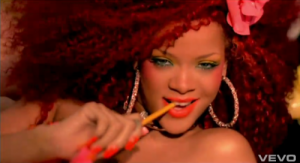by Ness Fraser
 I started out with a plan to write about the recent controversy caused by Rihanna’s S&M song and video, and how the world seems to be outraged that a woman is singing so frankly about sex. But the more I researched, the more I realized that the outrage surrounding Rihanna is only a small piece to a much larger puzzle.
I started out with a plan to write about the recent controversy caused by Rihanna’s S&M song and video, and how the world seems to be outraged that a woman is singing so frankly about sex. But the more I researched, the more I realized that the outrage surrounding Rihanna is only a small piece to a much larger puzzle.
Some people are pointing at Rihanna’s experience with domestic abuse and claiming that a survivor shouldn’t be singing about how much they enjoy to be rough in sexual situations. Of course, the first issue there is telling a survivor what they should or shouldn’t do. Secondly, the difference is that BDSM is consensual and domestic abuse is not. Whether or not Rihanna sings, “Sticks and stones may break my bones, but chains and whips excite me” is largely irrelevant and incomparable to the domestic abuse she suffered at the hands of Chris Brown.
As far as I’m concerned, Rihanna is a grown woman and can sing about whatever she likes — even when it comes to sex. From a feminist perspective, what worries me isn’t what’s going on in the video, or what she’s singing about, but rather that thousands of lyrics and videos that are just as graphic (if not worse) have been portrayed by men in hip-hop and largely ignored. Rapper 50 Cent proudly sang about how he was a “P.I.M.P.“– you know, someone who acts in a position of power over women, often forcing them to sell their bodies and then taking a cut of the money. More recently, Lil’ Wayne sings in his song 6 foot 7 that “two bitches at the same time/synchronized swimmers/ got the girl twisted ’cause she open when you twist her/never met the bitch, but I f-ck her like I missed her.”
Sex and sexual expression are both major themes in media—in hip hop and other music— but I have to wonder why it’s a big deal now. If Rihanna’s video is so inappropriate, then why haven’t we drawn the line for male-led videos that feature women in constantly submissive roles? Why is it more acceptable to view a female being sexual in a submissive role rather than a woman who is choosing to be dominanted and confidently sexual? And why is it scarier for a woman to be sexually empowered than it is for men to constantly call us “bitches,” “hoes,” and “sluts”? Because striving towards sexual equality—even in music— is one more step towards living in an egalitarian world. And like so many other facets of equality in mainstream media, we’re not quite there yet.
This is an issue that is constantly presenting itself to modern feminists. Are songs like Rihanna’s sexist or empowering? It is such a tough call to make, especially when, as you point out, so many male artists are doing the same thing. It could be a long time before this kind of content is seen as liberating for women, yet the song is still extremely popular.
I used to be big into blogging and looking up sex things online when I first found ness. I found her posting on college candy and then started to notice she did not anymore.. which was a good thing because all he views changed after a while and she was contradicting herself all the time I was just wondering what makes her such a modern day feminists when she used to write about sleeping with who you want then changing to you have to love the person I think this girl is just a big fraud and needs to be taken off this site.
Ness Fraser is a valued member of our SPARKteam. This blog has gotten more comments and hits on Facebook and Twitter than most of our blogs this year due to the tough nature of the topic. That what a blog is suppose to do–create discussion and thought! I hope you will all continue to read our material and often comment when necessary without name-calling. A fraud is someone who pretends to be someone they are not. Changing a viewpoint on something as you mature or grow does not fit in this category (if that is the case). At SPARK we value and appreciate all readers and opinions as long as they remain civilized. We also value all forms of feminism, activism, and thought-provoking blogs. Feel free to e-mail a guest blog that is SPARK-related to dana@hghw.org.